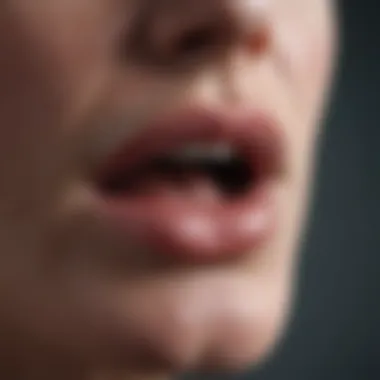Effective Strategies to Heal Cold Sore Scabs Quickly


Intro
Cold sores, often termed fever blisters, can be a source of discomfort for many. They typically arise at an inconvenient moment, appearing as painful scabs that not only hurt but can also be a cause for embarrassment. Understanding the healing process alongside effective approaches can vastly improve one's recovery timeline.
This section of the article aims to expound on fast yet effective methods to heal these scabs, informed by both scientific inquiry and anecdotal experiences. It is crucial for anyone dealing with cold sores to have a solid grasp on the strategies that promote healing while minimizing discomfort. The ensuing discussion will dive into lifestyle adjustments, topical treatments, and the importance of nutrition.
Wellness Insights
To start with, let’s explore how maintaining overall wellness plays a critical role in healing cold sore scabs.
The Role of Stress Management
Stress is like a double-edged sword when it comes to cold sores. It can trigger outbreaks while simultaneously impairing the body’s ability to heal effectively. Incorporating stress-relief techniques into one’s daily routine can be beneficial. Regular meditation, for instance, can not only soothe an overwhelmed mind but also boost the immune system. Activities like yoga and tai chi have a calming effect, further supporting a holistic approach to health.
Sleep: The Unsung Hero
Alongside stress management, ensuring adequate sleep cannot be overlooked. It’s during sleep that the body goes into repair mode, and lacking this crucial time can slow down healing. Aiming to get 7 to 9 hours of restorative sleep is essential. A consistent bedtime routine can improve sleep quality, and gentle practices like reading or aromatherapy may also help wind down before sleep.
**"A healthy mind leads to a healthy body; both play a part in how quickly cold sores scab over and heal."
Nutrition Information
Nutrition plays a pivotal role in speeding up recuperation from cold sore scabs.
Immune-Boosting Nutrients
A balanced diet rich in vitamins and minerals supports body functions, including the immune response. Consider incorporating foods high in vitamin C—oranges and strawberries, for example—as they can help form a vital component in wound healing. Zinc, found in beans and nuts, is crucial for immune function. To further bolster your recovery, you can prioritize foods rich in lysine, such as dairy products and fish, as they counteract arginine, an amino acid that can exacerbate herpes simplex viruses.
Meal Planning and Preparation
Meal prep can simplify the quest for nutritious meals. Plan meals in advance to include a variety of fruits, vegetables, lean proteins, and whole grains. Think of creating colorful salads topped with seeds and nuts, or maybe a smoothie loaded with leafy greens and berries. These not only support healing but can also lift spirits during a frustrating cold sore episode.
Epilogue
In sum, cold sore scabs, albeit pesky, can be managed effectively through a combination of lifestyle habits and mindful dietary choices. By fostering wellness insights that blend stress management and adequate sleep together with nutrition strategies that supply vital healing nutrients, individuals can take proactive steps toward recovery. Armed with this understanding, the next cold sore encounter can be approached more strategically.
Understanding Cold Sores
Cold sores, often recognized as pesky little blisters, are more than just an aesthetic nuisance. Understanding them is crucial for anyone aiming to minimize their impact. Cold sores are typically caused by the herpes simplex virus, predominantly type 1. Once contracted, the virus remains dormant in the body, ready to resurface under certain conditions.
What Causes Cold Sores?
Cold sores can be triggered by a variety of factors. Stress, fatigue, hormonal changes, and sun exposure are common culprits that can activate the dormant virus. Even something as simple as a cold or fever can set the stage for a cold sore to appear. The virus spreads easily, often through close contact like kissing or sharing utensils. Awareness of these triggers not only aids in management but can also empower individuals to take proactive steps to prevent outbreaks.
The Life Cycle of a Cold Sore
Understanding the life cycle of a cold sore can illuminate why timely intervention is vital. Initially, after the virus reactivates, an urge or tingling sensation may signal the onset. This is followed by the blister stage, where fluid-filled lesions appear, often causing discomfort. As the sore progresses, it will crust over and eventually heal. The entire cycle can vary in length but typically lasts 7 to 10 days. Recognizing each stage helps in identifying the right treatments at optimal times, potentially speeding up the healing.
Symptoms and Stages of Cold Sores
The symptoms can be quite telling. The process starts with itching or tingling, which gives way to small blisters. These blisters might break open, ooze, and form a scab. The discomfort often ranges from mild to severe, depending on the individual. Additionally, swollen lymph nodes and fever may accompany outbreaks in some cases. By understanding these symptoms, individuals can act quickly—whether that means applying a topical treatment or consulting with a healthcare provider.
In summary, having a nuanced understanding of cold sores, their causes, life cycle, and symptoms provides the groundwork needed for effective treatment. This knowledge can also lead to better preventive measures, effectively reducing the frequency and severity of outbreaks.
By comprehending the full scope of this affliction, readers will be better equipped to tackle the discomfort and restore their comfort during outbreaks.
The Science of Healing


Understanding the healing process of cold sores is not just a matter of knowing how to apply a topical cream. It’s a deeper dive into the body’s own mechanisms that tackle these unwelcome lesions. This section illuminates the biochemical pathways and physiological factors that play roles in expediting healing. By grasping the science behind the healing of cold sore scabs, individuals can truly leverage this knowledge to enhance their recovery strategies.
How Cold Sores Heal
When cold sores appear, often heralded by a tingling sensation, the body goes to work almost immediately. The healing process begins at the cellular level. The first players on the scene are the immune cells, ready to fight off the herpes simplex virus lurking under the skin. These cells send out signals that recruit additional immune support—like calling in reinforcements for a battleground.
Typically, the healing process flows through a few key stages:
- Initial Inflammation: This is when the body recognizes the virus. Blood vessels dilate to allow more immune cells to reach the affected area. While this is good for healing, it can cause redness and swelling.
- Formation of Scabs: As the ulcerative sores begin to heal, crusting occurs. This prevents bacteria from entering the wound and acts as a protective barrier.
- Regeneration: New skin cells start to proliferate, covering the scabbed area. This is essential for restoring the skin’s normal appearance.
- Final Maturation: The new skin strengthens and changes its properties to resemble untouched skin. This process can take several days to weeks, depending on various factors.
One aspect that’s pivotal in this whole process is the presence of moisture. Keeping the area hydrated can significantly enhance the skin's ability to repair and regenerate, smoothing the skin’s surface as it re-grows.
Factors Affecting the Healing Process
Several variables can influence how quickly cold sores heal. Some of these are biological, while others relate to everyday lifestyle choices. Understanding these factors can empower individuals to take charge of their cold sore management.
Key factors include:
- Immune System Strength: A robust immune system can respond more quickly to the virus. Good sleep, proper nutrition, and regular exercise can bolster your immune defenses.
- Hydration Levels: Dehydrated skin can prolong healing. Drinking water and using moisturizers play roles in maintaining skin health and elasticity.
- External Irritants: Triggers such as harsh weather (cold winds or excessive sun) can stall healing. Protective balms can offer a needed barrier.
- Diet: Certain foods can either exacerbate or aid the healing process. For instance, foods rich in lysine may help mitigate outbreaks, while arginine-rich foods can potentially aggravate them.
"By taking these factors into account, one can better navigate the landscape of healing from cold sore episodes."
Moreover, mental well-being plays an important role in bodily functions. Stress may suppress the immune response and potentially hinder healing. Thus, incorporating stress-reduction techniques such as mindfulness or light exercises could pave the way for a quicker recovery.
In summary, recognizing the intricacies of how cold sores heal can lead to more effective and informed choices in managing outbreaks. Paired with practical healing measures, individuals can reduce their discomfort and promote a smoother recovery.
Topical Treatments for Cold Sores
Topical treatments are pivotal when it comes to speeding up the healing process of cold sore scabs. Unlike oral medications, these are applied directly to the affected area, allowing for localized treatment that can offer fast relief. Utilizing topical treatments can significantly reduce the duration of an outbreak while mitigating pain and discomfort, making them an essential component of cold sore management.
Over-the-Counter Creams and Ointments
Over-the-counter creams and ointments are usually the first line of defense. Common products often contain docosanol, which works by preventing the virus from entering the cells, thereby inhibiting its spread. When applied early in an outbreak, these creams can shorten healing time by up to a day or more.
Some products also include ingredients such as hydrocortisone and benzocaine, which help to soothe irritation and reduce inflammation. It is wise to apply these creams at the first sign of a cold sore. Ideally, one must dab a thin layer on the affected area several times throughout the day. Following the instructions on the packaging is crucial for effective treatment.
- Benefits of Over-the-Counter Treatments:
- Quick relief for pain and discomfort
- Accessibility without prescriptions
- Easy application
Still, one should be cautious. Not every cream suits everyone; individual skin sensitivities can trigger adverse reactions. It’s a good idea to do a patch test before fully applying the product. If problems persist, it’s worth consulting a healthcare professional.
Natural Remedies: Do They Work?
In the quest for effective healing, many individuals turn to natural remedies. Ingredients like aloe vera, tea tree oil, and honey often appear on lists promising relief. Aloe vera, in particular, is touted for its soothing properties and can help with inflammation and moisture retention.
However, it’s essential to keep in mind there is limited scientific evidence supporting the efficacy of these natural treatments compared to conventional creams. Some reports suggest that applying lemon balm extract could reduce the duration of outbreaks. The herbal option may work best in conjunction with other treatments and offers additional soothing benefits.
- Popular Natural Remedies:
- Aloe vera gel
- Tea tree oil
- Lemon balm extract
- Honey
At the end of the day, one must approach natural remedies with realistic expectations. Researchers have yet to conclusively establish their efficacy, and they shouldn’t replace medical treatments if the outbreaks are frequent or severe.
The Role of Antiviral Medications
When topical treatments and natural remedies don’t cut the mustard, antiviral medications may be the next step. These medications usually come in oral form, but some topical versions exist too, like acyclovir cream. Antivirals work systematically to target the virus and help inhibit its replication. They tend to shorten the duration of outbreaks and lessen symptoms.


For individuals who experience recurrent or severe outbreaks, a healthcare provider might prescribe a daily antiviral regimen as a preventive measure.
- Benefits of Antivirals include:
- Reduced severity of symptoms
- Shortened healing time
- Preventive measures against future outbreaks
In summary, integrating topical treatments into your routine can work wonders when dealing with cold sores. Each strategy has its place in the overall healing narrative. Using a combination, where feasible, can lead to faster healing and a more comfortable experience while dealing with cold sore scabs.
Home Remedies and Lifestyle Adjustments
The management of cold sores isn’t just left to medications and creams; a holistic approach that includes home remedies and lifestyle adjustments can significantly aid in speeding up the recovery process. Understanding these elements is crucial for anyone dealing with the discomfort of cold sore scabs. While the scientific data should not be ignored, many find relief through practical, everyday measures that touch on both physical well-being and mental balance.
Cold Compresses and Moisturizers
Utilizing cold compresses can work wonders for reducing swelling and pain associated with cold sores. When you apply a cold compress, it helps to alleviate discomfort by numbing the area, lessening the urge to scratch or touch the affected region. To create an effective compress, simply wrap ice cubes in a clean cloth or use a chilled gel pack, placing it on the sore for around 10-15 minutes.
Moisturizers play a pivotal role as well. They keep the skin hydrated and prevent cracking, which is key during the healing phase. Opt for fragrance-free products that contain soothing ingredients like aloe vera or vitamin E. This can maintain skin elasticity and aid in faster healing.
Dietary Influences on Healing
Diet cannot be understated when discussing recovery from cold sores. Proper nutrition may not just facilitate healing but also bolster your immune system, making you less susceptible to viruses. Foods rich in lysine, such as yogurt, fish, and legumes, can be particularly beneficial. On the flipside, you might want to avoid foods high in arginine, like nuts and chocolate, which could potentially trigger outbreaks.
- Incorporate:
- Limit:
- Yogurt
- Fish
- Legumes
- Nuts
- Chocolate
- Grains
This balanced approach nourishes both the body and skin, directly influencing your recovery time.
Hydration and Its Importance
Staying well-hydrated is another essential factor often overlooked. Moist skin is less likely to crack, so drinking adequate water aids not just in overall health but also specifically in the healing of cold sores. Hydration facilitates cellular repair and improves circulation, which helps the body fight the virus more effectively. Aim for at least 8 to 10 glasses of water daily. Herbal teas can also make a nice addition, providing warmth while assisting in hydration.
Stress Management Techniques
Stress is a known trigger for cold sore outbreaks, so effective stress management techniques are vital. Mindfulness practices can help maintain a steady footing, lessening the likelihood of a relapse. Here are a few methods you might consider:
- Mindful Breathing: A few minutes focused solely on your breath can create a sense of calm.
- Meditation: Engaging in daily meditation helps clear the mind and can reduce anxiety levels.
- Regular Exercise: Getting your body moving not only boosts endorphins but also strengthens your immune system.
"An ounce of prevention is worth a pound of cure."
Overall, lifestyle adjustments coupled with natural remedies create a comprehensive plan to not only treat but also prevent the recurrence of cold sores. It’s about fostering a nurturing environment for your body and mind, which can ultimately lead to a faster recovery.
Preventive Measures
In the context of managing cold sore scabs, preventive measures are the unsung heroes. Often, people focus on treating the adverse effects of cold sores, but neglecting prevention can lead to a cycle of reoccurrence that feels like trying to patch a leaky dam with a band-aid. Besides, recognizing what triggers an outbreak can be crucial to ensuring your skin remains healthy and free of sores for as long as possible.
Cold sores can be pesky little things that pop up at the most inconvenient times, often when we’re under stress or feeling a bit run down. It's beneficial to develop an understanding of what prompts these unwelcome guests. Taking proactive steps can save you not just discomfort, but also time spent struggling with the imperfect process of healing from cold sores.
Identifying Triggers
Spotting the culprits behind cold sore outbreaks can be like piecing together a jigsaw puzzle; at first, it may seem daunting, but once you begin to see the patterns, it all begins to make sense. Stress, fatigue, skin injury, and even excess sun exposure can rattle the immune system and trigger the herpes simplex virus, which causes cold sores. Additionally, hormonal shifts, especially in women, can make one more susceptible to breakouts.
- Stress: Find what calms you—be it meditation, yoga, or simply taking a walk.
- Fatigue: Never underestimate the power of a good night's sleep.
- Skin Injury: Protect your lips and surrounding areas if you’re prone to trauma.
- Sun Exposure: Applying a lip balm with SPF can be your best friend in sunny weather.
By keeping a journal or diary, you can track when you are feeling off. Note what you were doing, how much sleep you got, or if you consumed more alcohol than usual. These reflections can shed light on your personal triggers, helping you create a tailored action plan.


Practicing Good Hygiene
Good hygiene is more than just handwashing; it’s the first line of defense in preventing cold sore outbreaks. Avoiding close contact with those who have active sores is a no-brainer, but also being aware of your own habits is equally vital. Cold sore viruses can be transmitted via skin contact and contaminated objects, making awareness key.
"Keeping hands, surfaces, and items that touch the face clean can be as effective as antiviral medications at preventing spread."
To minimize the risk:
- Wash Your Hands Regularly: Soap and water can be your best allies in this fight, especially after touching your face.
- Avoid Sharing Personal Items: This includes towels, lip balms, or utensils; think of it as safeguarding your personal fortress from invasions.
- Limit Touching Your Face: Avoid the temptation to touch your face; even when they’re just itching, it can lead to bigger troubles.
- Keep Nails Short: This simple practice reduces the chance of accidentally causing injury while touching your face.
Hygiene isn’t a one-time task; it’s a daily routine. By integrating these habits into your lifestyle, you empower yourself and those around you to stay healthy. Overall, preventive measures are less about what works and more about creating a lifestyle that values skin health.
When to Seek Medical Advice
Recognizing when to reach out for medical help can not just save time but can also prevent a cold sore from spiraling into something more severe. While cold sores often heal on their own, there are certain scenarios where consulting a healthcare professional becomes paramount. Knowing these circumstances can significantly improve the healing process and ensure that complications are identified early.
Some patients tend to dismiss initial symptoms or complications, thinking they can manage them alone. However, this approach may lead to prolonged discomfort or even more serious repercussions. So, what are the signs that it might be time to seek medical advice regarding cold sore scabs?
Recognizing Complications
Complications can arise even from something as seemingly benign as a cold sore. Here are common complications to be aware of:
- Persistent Symptoms: If your cold sore lasts longer than two weeks, that might indicate a need to see a doctor.
- Severe Pain: An increase in pain can indicate an infection or other issues.
- Accompanied Symptoms: If you experience fever, swollen lymph nodes, or a rash beyond the cold sore, it might be time to check in with a healthcare provider.
- Recurring Outbreaks: Frequent reappearance of cold sores could signal a need for antiviral medicines or a change in lifestyle factors.
It's important to pay attention to your body. If any of these signs pop up, do not hesitate to make an appointment.
"Cold sores shouldn't disrupt your daily life. Knowing when to seek help can save you from unnecessary suffering."
Consulting a Healthcare Professional
When making the decision to reach out to a healthcare expert, consider the following points:
- Accurate Diagnosis: Sometimes, what appears to be a cold sore may not be one. A healthcare professional can provide the right diagnosis and recommend effective treatments.
- Specific Treatment Options: If over-the-counter solutions haven’t worked, a doctor may prescribe stronger antiviral medications that work better for your specific situation.
- Personalized Advice: A healthcare professional can tailor recommendations based on your medical history and current health status. This may include lifestyle changes or additional therapies aimed at reducing outbreaks.
- Psychological Support: Beyond the physical healing, some might experience emotional distress associated with recurring cold sores. Discussing these feelings with a professional can open pathways to improved coping strategies.
In summary, delaying medical consultation can cause unnecessary complication and extended recovery. Being proactive isn’t just smart; it’s essential. Taking these steps can significantly enhance your approach to healing and, ultimately, your quality of life.
Future Directions in Cold Sore Management
Cold sore management has evolved significantly over the years, but there's still plenty of room for improvement. Future directions in this field are essential for developing more effective and promising approaches for individuals afflicted by the herpes simplex virus. As we delve into emerging treatments and the role of vaccination, it becomes clear that combining scientific research with practical application is crucial for creating a robust framework for managing these pesky blisters.
The focus on innovative methods can lead to quicker recovery times and improved patient comfort. By understanding new developments, health professionals, wellness coaches, and nutritionists can better guide their clients in managing cold sores. This knowledge fosters an environment where individuals feel empowered to take control of their wellbeing.
As scientists and medical experts work toward refining treatment options, it’s important to consider the implications of these advancements for various demographics, particularly for those with weakened immune systems or chronic conditions. Furthermore, awareness regarding the psychological impact of cold sores is rising, emphasizing the need for a comprehensive care approach that integrates mental health alongside physical treatment.
Emerging Treatments
A variety of emerging treatments for cold sores is under investigation, leveraging newer technologies and insights from ongoing research.
- Gene Therapy: Preliminary studies suggest that gene therapy could interrupt the life cycle of the virus by modifying how cells respond to infection. The aim is to provide a long-lasting solution for frequent outbreaks.
- Topical Antivirals: New formulations of topical antiviral medications are being developed to enhance bioavailability and improve absorption into the skin, effectively targeting the virus more efficiently.
- Molecular Solutions: Investigational therapies, including those targeting viral protein synthesis, show promise by inhibiting the virus's replication ability, offering potential for quicker healing.
These advancements depend significantly on continued research and clinical trials to establish their efficacy and safety. If successful, these treatments could offer benefits well beyond what is available today, enhancing quality of life for sufferers.
The Role of Vaccination
Vaccination represents a monumental shift in cold sore management. Though there are no widely available vaccines for the herpes simplex virus yet, excellent strides are being made in clinical trials aimed at developing effective prevention methods.
The benefits of vaccination could include:
- Reduced Frequency of Outbreaks: A vaccine could help the immune system generate a more robust response, decreasing the likelihood of future outbreaks.
- Minimized Transmission: By creating immunity within a larger population, the spread of the virus can potentially be curtailed, protecting those at risk, like infants and immunocompromised individuals.
- Enhanced Quality of Life: Fewer outbreaks would lead to less disruption in social and professional environments, offering individuals a renewed sense of normalcy.
The introduction of a vaccine for cold sores hinges on extensive research and global healthcare collaboration. Efforts have intensified, with researchers exploring various platforms, including live attenuated viruses and subunit vaccines, hoping to establish this preventive measure in the near future.
Informed and proactive strategies are key as we wait for these advancements to materialize and bring new hope to those affected by cold sore outbreaks.



